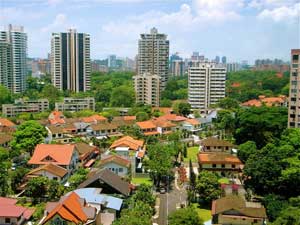House prices up by 1.67% y-o-y in Q3 2019
Singapore’s house price rises continue, albeit at a much slower pace, amidst slowing economy. House prices rose by 1.67% during the year to Q3 2019, a sharp slowdown from a y-o-y growth of 7.93% a year earlier. Quarter-on-quarter, house prices increased 1.23% during the latest quarter.

Demand continues to fall
In 2018, total home sales, which include new sales, sub-sales and resales, fell by 11.5% y-o-y to 22,139 units, in contrast to a y-o-y growth of 52.7% in the prior year, according to the Urban Redevelopment Authority (URA). The weakness of demand continues this year, with home sales falling by almost 22% y-o-y to 14,272 units in the first three quarters of 2019.
In Q3 2019, there were a total of 372,085 housing units available in Singapore, up by 0.1% from the previous quarter, according to URA. Of which 349,266 units are occupied, while the remaining 22,819 units are available, making up a 6.1% vacancy rate (down from 6.4% in Q2 2019, 6.3% in Q1 2019, 6.4% in Q4 2018 and 6.8% in Q3 2018).
Rents, rental yields: yields are poor in Singapore at 3.3%
Singapore apartment costs are high, at around $14,373 per sq. m.
| Singapore: typical city centre apartment buying price, monthly rent (120 sq. m) | |||
| Buying price | Rate per month | Yield | |
| Singapore | $1,724,760 | $4,736 | 3.30% |
Recent news. Singapore’s economy grew by a miniscule 0.1% in Q3 2019 from a year earlier, at par with the previous quarter’s growth, which was the slowest y-o-y expansion in nearly a decade. This was mainly attributed to a decline in manufacturing and exports sector, amidst the ongoing US-China trade war. Though on a quarterly basis, the economy grew slightly by 0.6%, a turnaround from the previous quarter’s 2.7% contraction. Economic growth this year is expected between 0% and 1%, down from the government’s previous estimate of 1.5% to 2.5% and a slowdown from expansions of 3.2% in 2018 and 3.9% in 2017.